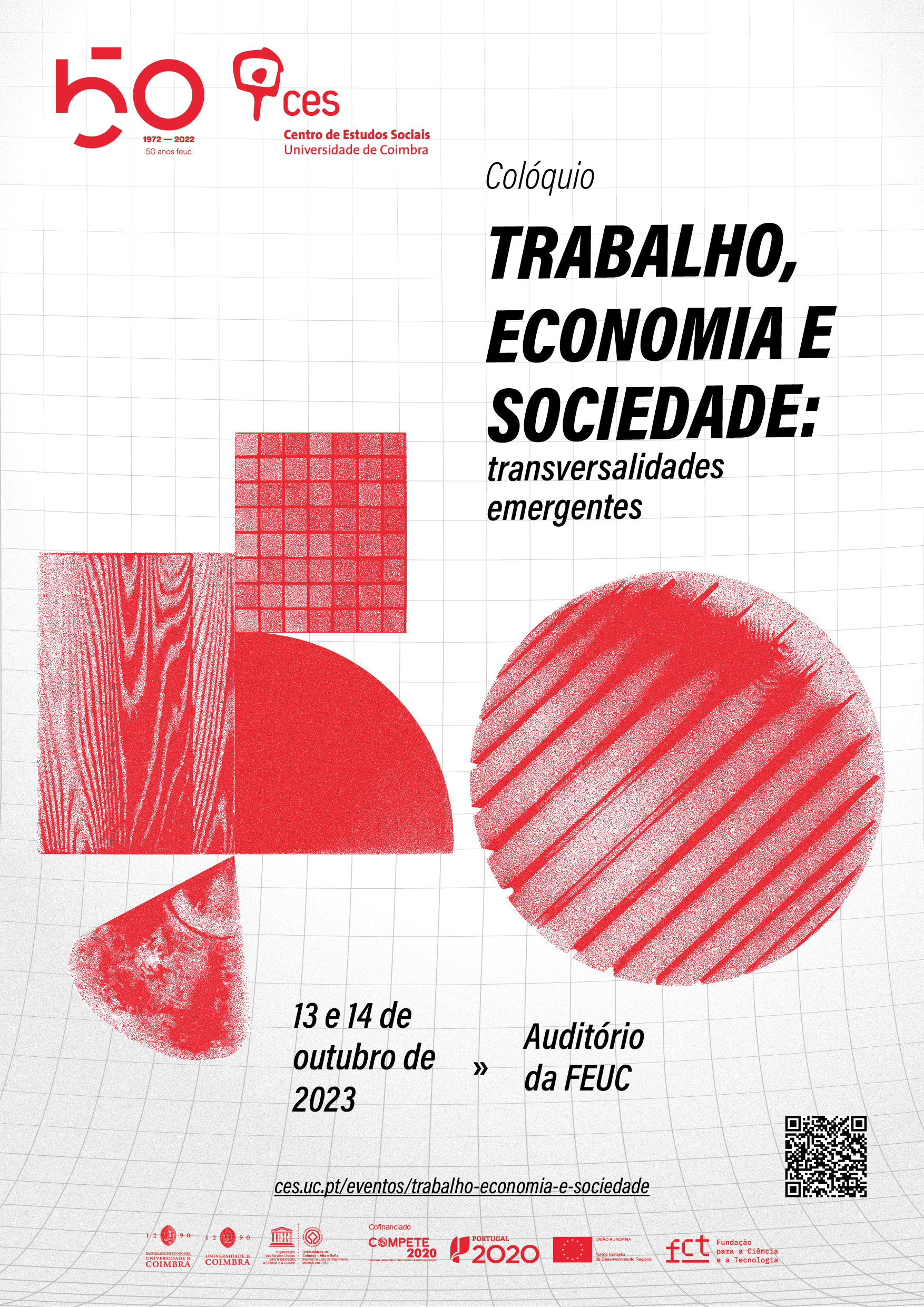International Colloquium
LABOUR, ECONOMY AND SOCIETY: Emerging transversalities
October 13 and 14, 2023
Auditorium, Faculty of Economics - UC
About
As part of the celebrations of the 50th anniversary of the Faculty of Economics of the University of Coimbra (FEUC), the international conference “Labour, Economy and Society: emerging transversalities” calls for the urgency to place the factor “labour” at the centre of a collective reflection aimed at critically analysing the economic and social dynamics of our time. It also does justice to one of the problems that has been the object of research carried out at the Centre for Social Studies of the University of Coimbra (CES), as well as a structuring element of the teaching/training processes under the doctoral offer in which the CES and FEUC have actively cooperated.
From a socio-historical point of view, it is important to recall the role of labour struggles since the first half of the 19th century, a crucial pillar for the dignification of living and working conditions, as well as for the structuring of the identity of the modern working class. As a corollary to this, the 20th century reflected fundamental achievements, of which the reduction of the working day to 8 hours a day is just one example, by the way, referring to a theme addressed by the first convention of the International Labour Organisation, created in 1919. In the same way, the Welfare State and the whole legislative building that embodied labour law, especially from the post-war period until the 1980s, were a guarantee of stability and security in terms of wages, working hours and working conditions. In Portugal this process occurred mainly following the democratic revolution of April 25th 1974. But the last decades, by witnessing an intensification of neoliberal globalisation and financialisation of the economy, have also contributed to a deepening of the commodification of labour and to accentuate the fragility of collective actors and the inefficiency of public policies. The crises in the European territory and austerity have generated processes of exclusion that have increased the precariousness of work and labour relations, and have accentuated pre-existing inequalities, particularly more evident in the peripheral countries of southern Europe.
Bearing in mind some of these contemporary socio-economic transformations, this colloquium focuses mainly on the Portuguese reality, challenging the participants to map the problems that surround the world of labour and identify ways of overcoming them - the emerging transversalities - under various prisms of analysis: sociological, economic, legal, historical, political, among others. While the opening and closing lectures are intended to open horizons in a transversal manner, the thematic sessions focus on more specific themes, although articulation and combination between them is inevitable.
The first theme is an invitation to situate labour in the framework of the Portuguese economy, while also considering the responses undertaken in the field of social protection. Secondly, it is inevitable to confront the emergence of new dynamics in the world of work and realities that prevail from the past, which in itself calls for debates on forms, bonds or work instruments, or on ways of organising and providing work. Thirdly, the way in which the various factors of inequality, namely gender inequality, manifest themselves in the world of work will be discussed, determining segregation, discrimination and even violence and harassment phenomena with individual and collective impacts. Likewise, the connection of work with the issues of social dialogue (in its multiple forms and scales of analysis) instigates a perception of its results and the involvement of its actors, leaving open the possibility of including new themes and protagonists.
In short, this colloquium intends to contribute to an effective valorisation of work, drawing attention to the need to reflect on its centrality. The contributions of specialists from various academic, disciplinary and institutional areas contribute to this purpose in a double way. Both by mapping out problems and diagnoses, and by suggesting concrete paths to follow, anchored, if possible, in realistic options for labour dignification.
On October 11th, 2023, preceding this colloquium, the conference «Acceleration and the World of Work», presented by Hartmut Rosa, a well-known social and political scientist dedicated, among other topics, to the study of social acceleration as a characteristic of modernity, a problematic that the author develops from a critical theory point of view, works as an antechamber of the event.
[Free registration but compulsory] > It will be possible to receive new registrations on the days of this event and specific participants must register at the reception desk of the activity, at FEUC
Organising Committee | Ana Alves da Silva, António Casimiro Ferreira, Hermes Augusto Costa, João Rodrigues, Manuel Carvalho da Silva, Rosa Monteiro, Teresa Maneca Lima


